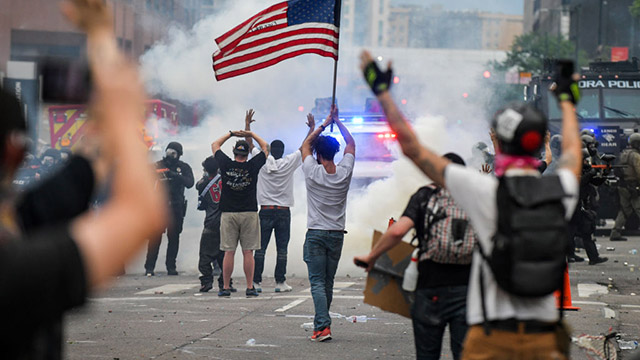Northwestern political science professor Alvin Tillery says the continuing uprisings over police brutality have left him with three observations about the state of the country.
White House is pursuing a political response to the crisis
“As President Trump and Attorney General Barr demonstrated with their shockingly unconstitutional decision to use federal law enforcement to clear peaceful protesters and journalists from Lafayette Park with tear gas and violence so that they could conduct a photo-op in front of St. John’s Church, the White House is clearly pursuing a political response to the crisis that is informed by their imperial and authoritarian view of the presidency.
“President Trump’s approach should not be a surprise to anyone. He won the presidency with a razor thin margin in the Electoral College and lost the popular vote by more than 3 million voters. His path to another victory in 2020 will be mobilizing the roughly 35 percent of Americans who constitute his hardcore base to turnout in large numbers in the swing states. His photo-op stunt is tailor-made to appeal to that crowd. What is truly alarming is the potential further authoritarian turn our nation could take if these tactics prove a successful path to victory for him in November. I think that the danger is particularly acute as Republicans in the Senate demonstrated an unwillingness to rebuke his show of excessive force when they blocked a Democratic Party resolution to condemn the actions at Lafayette Park.
“It is no exaggeration to say that this entire episode demonstrates how much the Constitution is on the ballot in November.
Democrats need proposals to counter ‘crushing inequalities’
“I have also been very surprised by the narrow range of the policy response put forward by the Democrats in Congress during this national drama. While I have been encouraged to see that the Democratic Party put the Congressional Black Caucus forward to revive discussions of some of the party’s long-standing agenda items around police reform — particularly legislation to end the qualified immunity that shields officers and departments from liability in cases of wrongdoing — it doesn’t seem that they are making the link to the deeper issues that cause racial inequality in the first place and have led the multiracial crowds of young people to take to the streets over the last week. In other words, the Democrats do not seem to be making any proposals that will actually counter the crushing inequalities that lead to the over-policing of black and brown neighborhoods and the economic precarity of our Millennial and Gen Z generations. If the Democrats underperform in 2020 or if Trump is reelected, I think that they will look back on this failure to connect the dots as a huge missed opportunity to solidify their support among communities of color and young white voters.
Can Black Lives Matter influence policy debate?
“As a scholar of protests, I would also like to highlight that we are in a very interesting phase in the life cycle of the #BlackLivesMatter movement. The hyper-democratic, decentralized nature of the movement has worked brilliantly in generating protest activities on the ground and giving Americans a vocabulary for articulating their emotions about the anti-racist struggle in America. The question for the movement now is can they use this same decentralized structure to influence the course of the policy debate in Washington and also to channel the energy of the street protests into a national political movement.”


